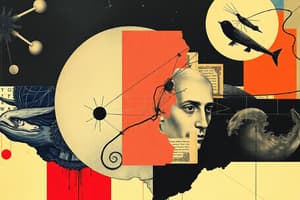Podcast
Questions and Answers
What is a myth?
What is a myth?
A myth is considered a true explanation of the natural world and how it came to be.
What type of characters are often found in myths?
What type of characters are often found in myths?
Characters are often non-human and typically gods, goddesses, supernatural beings, or mystical.
What is the typical setting of a myth?
What is the typical setting of a myth?
Typically ancient or prior to a time when records were kept and set in a world very similar to our own, but with supernatural monsters or areas.
What does the plot of a myth often involve?
What does the plot of a myth often involve?
How do myths relate to natural laws?
How do myths relate to natural laws?
What is the purpose of social action in myths?
What is the purpose of social action in myths?
What sense do myths often convey?
What sense do myths often convey?
What dualities are often present in myths?
What dualities are often present in myths?
What is the emphasis on language in myths?
What is the emphasis on language in myths?
What purpose do myths serve in relation to real-world events?
What purpose do myths serve in relation to real-world events?
Flashcards
Myth Definition
Myth Definition
A true explanation of the natural world and its origins.
Myth Characters
Myth Characters
Often non-human, including gods, goddesses, or supernatural beings.
Myth Setting
Myth Setting
Ancient or pre-record times, often like our world, but with magic.
Myth Plot
Myth Plot
Signup and view all the flashcards
Myth Natural Laws
Myth Natural Laws
Signup and view all the flashcards
Myth Social Action
Myth Social Action
Signup and view all the flashcards
Myth Sense
Myth Sense
Signup and view all the flashcards
Myth Dualities
Myth Dualities
Signup and view all the flashcards
Myth Language
Myth Language
Signup and view all the flashcards
Myth and Real Events
Myth and Real Events
Signup and view all the flashcards
Study Notes
Definition of a Myth
- A myth is a narrative that offers a true explanation of the natural world and its origins.
Characters in Myths
- Myths often feature non-human characters, including gods, goddesses, and supernatural beings, enhancing their mythical nature.
Setting of Myths
- Typically set in ancient times or before written records, these settings resemble our world but include supernatural elements and creatures.
Plot Structure
- The plot may navigate between a supernatural realm and the contemporary world, showcasing fundamental human behaviors relevant to both contexts.
Natural Laws in Myths
- Events in myths often defy or alter natural laws to amplify the mystical aspects of the narrative.
Social Actions and Morality
- Myths convey moral lessons and dictate social behavior, embedding core values like individualism, family bonds, and community among mythical heroes.
Element of Mystery
- Myths convey a sense of mystery or the unknown, captivating audiences with unsolved questions.
Dualities in Myths
- Myths frequently explore dualities, such as good vs. evil and light vs. dark, which are essential to the story's conflict and resolution.
Importance of Language
- Language plays a critical role in myths, with heroes often depicted as adept storytellers, conveying wisdom and knowledge through narratives.
Metaphorical Significance
- Myths serve as metaphors, addressing real-world issues and posing existential questions about humanity's purpose, existence, and identity.
Studying That Suits You
Use AI to generate personalized quizzes and flashcards to suit your learning preferences.




